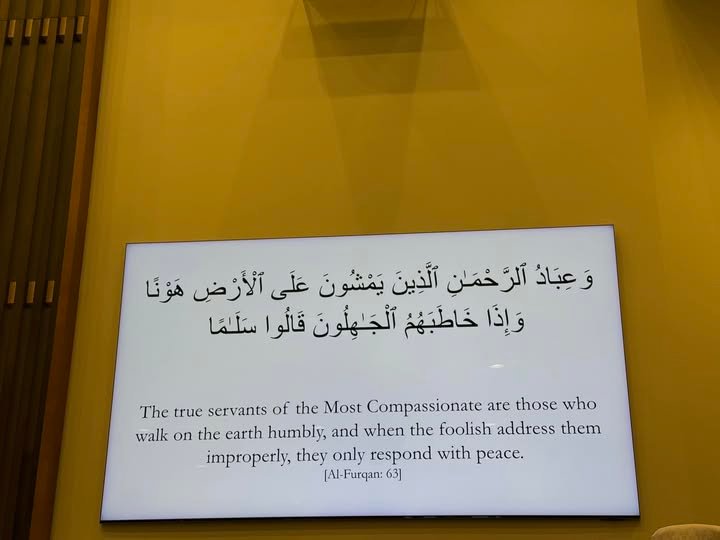Surah Al-Furqan (25:63), describes one of the noble characteristics of ‘Ibad-ur-Rahman

This verse, Surah Al-Furqan (25:63), describes one of the noble characteristics of ‘Ibad-ur-Rahman (the Servants of the Most Compassionate).
وَعِبَادُ ٱلرَّحْمَٰنِ ٱلَّذِينَ يَمْشُونَ عَلَى ٱلْأَرْضِ هَوْنًۭا وَإِذَا خَاطَبَهُمُ ٱلْجَٰهِلُونَ قَالُوا۟ سَلَٰمًۭا
“The true servants of the Most Compassionate are those who walk on the earth humbly, and when the foolish address them improperly, they only respond with peace.” (Al-Furqan: 63)
⸻
Tafseer (Explanation) of This Ayah:
This verse highlights two essential qualities of Allah’s true servants:
1. Humility in Character and Conduct:
• The phrase “يَمْشُونَ عَلَى ٱلْأَرْضِ هَوْنًا” (they walk on the earth humbly) signifies that the righteous do not exhibit arrogance or pride. Instead, they carry themselves with dignity, humility, and a gentle demeanor.
• Walking “humbly” does not mean weakness or lack of confidence but rather a balance between humility and self-respect.
• The Prophet Muhammad ﷺ himself was an embodiment of this trait. Despite his high status, he was always approachable, kind, and never displayed arrogance.
2. Responding to Ignorance with Peace:
• The second part of the verse “وَإِذَا خَاطَبَهُمُ ٱلْجَٰهِلُونَ قَالُوا۟ سَلَٰمًا” (when the ignorant address them, they respond with peace) teaches us that true believers do not engage in arguments or react with anger when confronted with ignorance, rudeness, or insults.
• Instead of retaliating or engaging in unnecessary disputes, they maintain their dignity by responding in a calm and peaceful manner.
• This aligns with another Quranic principle: “Repel evil with what is better” (Surah Fussilat 41:34).
⸻
Lessons & Reflections from This Ayah:
1. Humility is a Mark of True Faith:
Arrogance is condemned in Islam, while humility is a sign of righteousness. Those who recognize Allah’s greatness never feel superior to others.
2. Dignified Conduct in Adversity:
A believer does not waste time in arguments with those who are ignorant. Instead, they respond in a way that avoids conflict and reflects wisdom.
3. The Strength of Forbearance:
True strength is not in reacting aggressively but in maintaining self-control and patience. When provoked, remaining calm and responding with wisdom is an act of ibadah.
4. Dawah Through Good Manners:
Many people are drawn to Islam because of the noble character of Muslims. Responding peacefully to insults and ignorance can be a means of inviting others to understand Islam better.
⸻
Examples from the Life of the Prophet ﷺ:
• In Ta’if: When the Prophet ﷺ was mocked and attacked by the people of Ta’if, instead of cursing them, he prayed for their guidance.
• With the Bedouin: A man once pulled the Prophet’s cloak roughly, but he responded with kindness, teaching his companions patience.
• At the Conquest of Makkah: Instead of taking revenge on those who had persecuted him, the Prophet ﷺ forgave them, saying, “Go, for you are free.”
⸻
How Can We Apply This Verse in Our Lives?
• Practice humility in our dealings with people, avoiding pride and arrogance.
• Respond with patience and dignity when confronted with insults or ignorance.
• Be mindful of how we react to negativity, choosing peaceful words over harshness.
• Follow the Prophet’s ﷺ example of dealing with adversity with grace.
⸻
Conclusion:
This ayah beautifully outlines the qualities of ‘Ibad-ur-Rahman, the true servants of Allah. Their humility and ability to respond peacefully reflect a high level of faith and self-discipline. In a world where arguments and conflicts are common, adopting this Quranic principle can lead to inner peace and better relationships with others.

